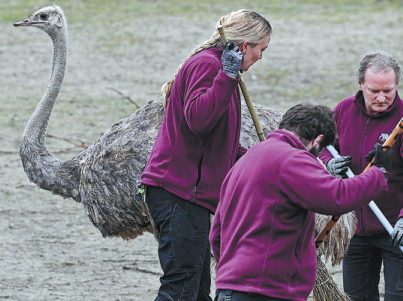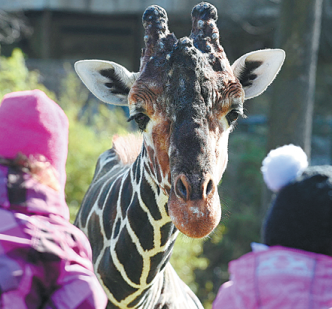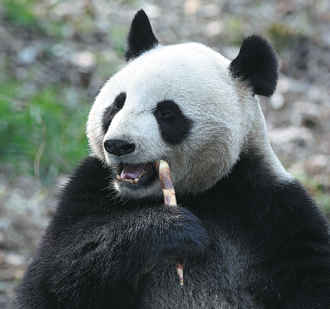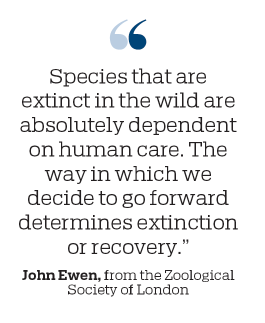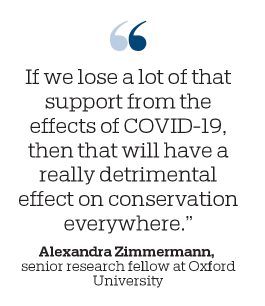CASH-STRAPPED ZOOS RETHINK FINANCIAL STRATEGIES

New ideas hatched to raise funds during pandemic
A few days after the Spring Festival holiday in February, Chen Kaiyin and her family members bought themselves a special new year present-an adoption certificate for a panda housed at Nanjing Hongshan Forest Zoo in Jiangsu province.
They decided to adopt a lesser panda, a rare species that has won State-level protection along with the giant panda.
Chen, who comes from Beijing and works in the media industry, said, "I've been following the zoo's activities for some time and finally decided to adopt an animal after seeing an interview with Shen Zhijun (the head of Hongshan Forest Zoo)."
In the 30-minute interview in August, Shen described how animals at the zoo were faring during the pandemic. He said that with the zoo's income falling, he was anxious about their welfare.
Chen, who loves visiting zoos, said she felt an obligation to help the zoo survive and develop, especially as it was focusing on improving the animals' living conditions.
She and her family chose Pang Pang, a female lesser panda, and paid 2,000 yuan ($308) to adopt her for a year. The zoo will use the money to help feed its animals each day and to pay for medical care they may require.
In return, people who adopt an animal receive a certificate, reports on its condition and free entrance to the zoo. They also have the chance to experience the animal being fed and cared for.
Online adoption is one of the projects launched by the zoo to help attract more visitors and raise additional financing during the pandemic.
Last year, the zoo lost more than 30 million yuan, accounting for 40 percent of the previous year's income.
More than 80 percent of its income comes from ticket sales, and lockdowns and a limited flow of visitors during the pandemic have had a significant effect on the zoo's operations.
Around the world, zoos face a similar or even worse situation.
In Canada, Paul Goulet, the owner of Little Ray's Nature Centre, a zoo and animal rescue organization with locations in Hamilton and Ottawa, said he is worried about becoming bankrupt, as the pandemic is killing his business.
Gross revenue is down 94 percent compared with before the pandemic emerged, due to forced closures and limits on capacity during the pandemic, Goulet told CTV News in Canada.
Although he has taken out loans totaling more than C$900,000 ($716,450) to help pay bills and has also cut costs where he can, the vast majority of his costs are fixed, such as food for the zoo's snakes, sloths and tortoises.
Jim Facette, executive director of Canada's Accredited Zoos and Aquariums, a private charitable organization representing the country's leading zoological parks and aquariums, said such facilities across the nation are having a hard time.
"They're hanging on, but it's a struggle,"Facette told CTV News.
He said some of these facilities qualify for the federal wage subsidy program and have received support, but others are not eligible.
"Our institutions are unique-you can't just switch off the lights, lock the door and leave," Facette said.
He has spent a lot of time during the pandemic lobbying governments to find ways to keep zoos and aquariums going.
Closed down
In the United States, Oakland Zoo in California has been losing about $2 million a month since being shuttered in mid-March last year.
USA Today quoted Nik Dehejia, executive vice-president of the zoo, which is nearly 100 years old, saying it has experienced "financial distress" due to a lack of visitors. Home to 750 large animals, the zoo faces costs of about $55,000 a day for their food, leaving it in dire financial straits.
Joel Parrott, the zoo's president, told the newspaper that since it closed, the zoo had cut corners on everything apart from animal care.
Nearly half the 250 employees have been laid off and senior staff members' pay has been cut.
Officials in California allowed the zoo to reopen its outdoor areas in late July, but it still faces a big challenge.
Visitors provide more than 90 percent of its revenue through ticket sales, concessions, rides, gift-buying and parties, but attendances and revenue at Oakland and at zoos around the US are falling.
In Florida, Dino Ferri, president of the Central Florida Zoo and Botanical Garden, told USA Today he woke up one night trying to work out how to recoup the $1.5 million the facility lost during the two months it was closed. It reopened in May.
Even when it was allowed to reopen, the number of visitors during the zoo's busiest months was far below expectations. It depends on visitors for 80 percent of its revenue.
Ferri had to lay off 40 percent of the employees, cut the salaries of leadership team members-including his own-and launch a campaign to raise $1.5 million by December last year to restore the zoo's operating budget to pre-pandemic levels.
Unlike tourist attractions that can reduce costs by suspending operations, zoos face high charges for animals' food, enclosures and health care.
In addition, many zoos and aquariums protect and breed endangered and rare species. Without sufficient funding, this vital conservation work has been put at risk.
John Ewen, from the Zoological Society of London, told the BBC: "Species that are extinct in the wild are absolutely dependent on human care. The way in which we decide to go forward determines extinction or recovery."
Alexandra Zimmermann, a senior research fellow at Oxford University, said zoos worldwide contribute a huge amount of financial support for conservation in the wild.
"If we lose a lot of that support from the effects of COVID-19, then that will have a really detrimental effect on conservation everywhere," Zimmerman told the BBC.
Last year, the government in the United Kingdom introduced the Zoo Animals Fund, providing zoos facing financial trouble during the pandemic with total funding of 100 million pounds ($139.2 million).
However, in a recent letter to UK Prime Minister Boris Johnson, the British and Irish Association for Zoos and Aquariums said the fund had failed to provide adequate support.
Many zoos are unable to access the money, as they must meet a series of conditions, which has proved virtually impossible for most of its members, the association said.
Of 300 licensed zoos, only 34 have been awarded funding to date, with a further 23 applications being processed.
Colchester Zoo, a private facility in eastern England, is among those that have been unable to access the government fund or which do not qualify for grants.
Heavily reliant on ticket sales, the zoo said in a statement it had been badly hit by the pandemic, and still faced bills for feeding the animals, heating and for additional indoor bedding during winter.
Since the onset of the pandemic in March last year, it has been surviving on emergency funds after being forced to close.
However, in February, the zoo's managing director said the emergency funds were nearly exhausted. An appeal was made to the public for financial support.
Raising money
On the Colchester Zoo website, visitors can choose different ways to support the facility, such as adopting an animal, donating to the emergency fund, buying tickets in advance and shopping from the facility's online store.
The zoo also wants to raise additional funds, and to date has received more than 7,000 pounds from the crowdfunding platform GoFundMe.
A 5-year-old boy, who has vowed to support the zoo, has raised thousands of pounds for its animals.
Thomas Rose, who has visited the zoo every month since he was 8 months old, was devastated when it had to close. He decided that he wanted to help, his mother said.
To raise sufficient funding to feed every animal at the facility for a day, the boy ran a marathon over 12 days dressed as a lion, his favorite animal.
Before he turned 6 on Feb 20, he had raised over 11,000 pounds, more than his target of 10,000 pounds.
Goulet, the zoo owner in Canada, said he has used every possible government assistance program, including wage and rent subsidies. He has received a total of about C$240,000.
With restrictions eased in Ottawa and Hamilton, small groups are now allowed to visit Little Ray's Nature Centre.
The zoo has also launched live Zoom shows, although they have only provided 5 percent of the amount it used to earn from shows at schools and birthday parties.
Goulet said: "I'm happy we're open, so instead of losing C$80,000 a month we'll lose maybe C$60,000. It will curb our losses, but we're still losing money at a fast rate."
He turned to the public for help, with a fundraising campaign amassing nearly C$200,000 in donations from more than 2,000 people in just over a week.
Meanwhile, after a two-month lockdown last spring, Toronto Zoo authorized drive-through visits for about a month before customers were allowed back in, but with capacity sharply reduced.
In July, the zoo, which has about 5,000 animals, said it would only accept advance bookings from visitors, before reverting to drive-throughs in late November.
It has raised about C$1 million through its nonprofit arm for a program called Zoo Food For Life.
Although it closed again on Dec 26 when the provincial authorities in Ontario issued a stay-at-home order, Dolf DeJong, the zoo's CEO, told CTV News he remains cautiously optimistic and hopes that it can host visitors again next month.
"We'd like to think we can start rallying from the losses we incurred early in the year," he said.
In China, many zoos are also exploring diversified business models, such as developing animal science courses, designing cultural and creative products, and cultivating animal celebrities to raise more money for their inmates and to maintain normal operations.
In Jiangsu province, a cute but naughty monkey named Kai Sa has become a star at Nantong Forest Safari Park. Many loyal supporters have bought the zoo's annual membership card and visit it every weekend.
The safari park has also developed more than 20 interactive projects, such as pigeon-feeding, to encourage more visitors.
The trend of coming up with new ideas to raise money might give governments and owners the chance to rethink zoos' functions.
Chris Draper, a zoologist from the UK, told Forbes magazine that some zoos make valuable contributions to conservation, but he also argued that the industry as a whole is not held to sufficiently high standards and should be overhauled or strengthened.
He believes the "zoo model" is flawed and that high costs for running facilities leave little to spend on habitat conservation and also put animals' lives in jeopardy during a crisis.
Shen, from Nanjing Hongshan Forest Zoo, said modern zoos should no longer be places for visitors solely to see animals, but they should also carry out conservation education.
More important, zoos should continuously enrich the living conditions of wild animals, improve their welfare and achieve species continuity, he said.
Over the years, Hongshan Forest Zoo has become popular among animal lovers and has earned their respect for its professionalism and caring approach.
In return, their love and respect helped the zoo through tough times when it was unable to buy sufficient food for some animals who are particularly fussy about their diets.
liuxuan@chinadaily.com.cn

